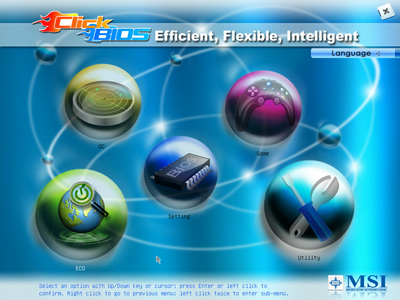Will BIOS Be Dead in 3 Years?
MSI will begin its shift over to UEFI by the end of the year, with the industry expected to follow over the next three years.
Is the end of BIOS almost upon us? That's the current speculation, with the date of termination expected in the near future. According to an unnamed spokesperson for MSI, the motherboard manufacturer is making the shift over to point and click universal extensible firmware interface (UEFI) systems by Q4 2010/Q1 2011. The change is expected to become "widely adopted" within three years thereafter.
The MSI spokesperson said that the first new products using UEFI will be based on Intel's Sandy Bridge chipset, and will range from entry-level motherboards to high-end solutions. This should be expected, as UEFI is a continuation of Intel's original EFI project designed to replace the clunky, elderly BIOS interface, and to address other problems that have plagued PCs for years, including hard drive storage limits beyond 2 TB.
But upgrading to UEFI isn't as simple as flashing the old BIOS with the new interface. "A UEFI system is generally bigger than a traditional BIOS," the spokesperson said, "and most of the on-board ROM is not that big, so you can’t just flash UEFI into a traditional BIOS board."
Motherboard manufacturers are also holding off on the new technology because of the resources needed to make the change. There's also a customization issue: UEFI doesn't support every board. Manufacturers who design unique features and technologies for their products--those that only communicate with BIOS--may not function with UEFI installed. Designs will eventually need to be re-worked to incorporate the new interface.
But MSI believes that UEFI is the way to go, the next evolutionary step even though UEFI still needs some work. The company may be right, especially as consumers require more and more storage space than what BIOS can currently handle.
Get Tom's Hardware's best news and in-depth reviews, straight to your inbox.

Kevin Parrish has over a decade of experience as a writer, editor, and product tester. His work focused on computer hardware, networking equipment, smartphones, tablets, gaming consoles, and other internet-connected devices. His work has appeared in Tom's Hardware, Tom's Guide, Maximum PC, Digital Trends, Android Authority, How-To Geek, Lifewire, and others.
-
skit75 I think it was almost 5 years ago when I read nearly the same article making the same prediction yet, here we are.Reply -
Computerrock1Go BIOS! I fear that I will lose fine tuning ability with something like this.Reply
don't be afraid of the future... efi will not make it worse... -
apple's had efi for how long? yeah it ain't that hard. mobo makers can sell a usb dongle efi to circumvent the bios.Reply
-
nukem950 Well, it is about time. I so want an UEFI board.Reply
I wonder when an AMD board will come out...
